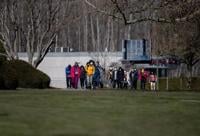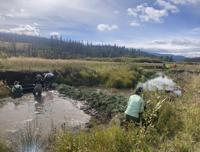VANCOUVER - If she didn’t squeak and squirm, she would look just like a child’s stuffed toy, but the weeks-old sea otter was in serious condition when she was brought in to the Vancouver Aquarium's Marine Mammal Rescue Centre on Tuesday.
Rescuers say the hungry pup took well to being bottle fed with puppy and kitten formula — combined with clams — every two hours by staff and volunteers who are monitoring her around the clock.
"It gives them the flavour that they actually really enjoy and the nutrients within the puppy and kitten formula," rescue centre senior manager Lindsaye Akhurst said in an interview Wednesday.
"She's done really well with it and it's also a good transition because we'll eventually, probably within the next few weeks, we'll start offering her some solid food and it will be clams."
Akhurst said the centre was called Monday by staff with Fisheries and Oceans Canada about a sea otter pup needing help near Tofino, on the west coast of Vancouver Island.
She said Fisheries officials were able to drive the pup to the ferry to meet rescue staff who brought her back to the centre where she was stabilized.
"She was still quite active and very vocal, very hungry. We're not sure how long she'd been separated from her mom," Akhurst said.
"We were able to give her some fluids and offer her a bottle. She is estimated (to be) only a few weeks old, so she still would be nursing on her own."
Akhurst said Fisheries staff are looking into how the pup, who has yet to be named, ended up on her own.
The non-profit society that runs the rescue said in a statement that people should never attempt to rescue a distressed marine mammal on their own, and any discoveries should be reported to the Fisheries Department or the centre's rescuers.
It says sea otter pups rely on their mothers for survival because they cannot swim, hunt, or regulate their body temperature on their own, and that the staff are "cautiously optimistic" as the otter's condition is stabilized.
The centre's executive director and head veterinarian Dr. Martin Haulena said in the statement that the pup is in "critical condition" and requires 24-hour care to ensure her survival.
Haulena said the cost of her care will be substantial.
Akhurst said it's too soon to say if the otter will be able to be reintegrated back into the wild.
"The rehabilitation process with sea otter pups is very extensive and hands on. Right now, obviously we're focusing on stabilizing her, getting her so she's starting to gain weight a little bit, and used to (being) in care," she said.
"Once we're in that process, we will work with our partners at the Vancouver Aquarium, Fisheries and Oceans Canada, to see what her future holds, and where she'll be placed."
She said the aquarium already has eight sea otters, all of which were rehabilitated in North America when they were very young.
She said rescuers are responding to more cases involving sea otters.
"The sea otter population within British Columbia is increasing, which is really great. There was a time when their numbers were quite low, and there was a bit of concern about them. But at this point, we probably will be seeing more and more of these cases."
This report by Ďă¸ŰÁůşĎ˛ĘąŇĹĆ×ĘÁĎ was first published June 19, 2024.










































